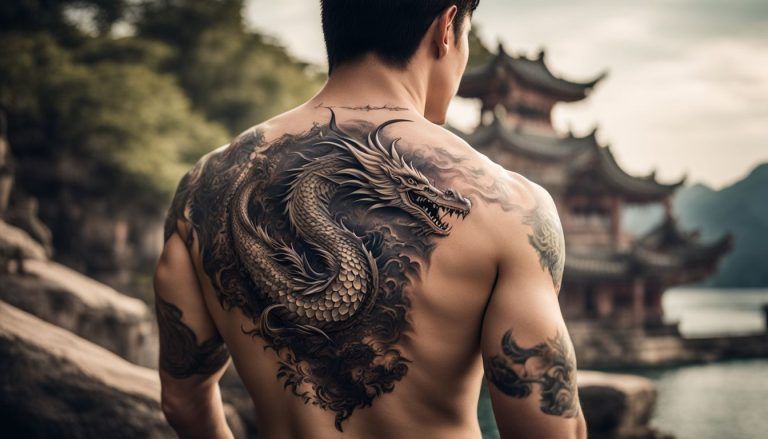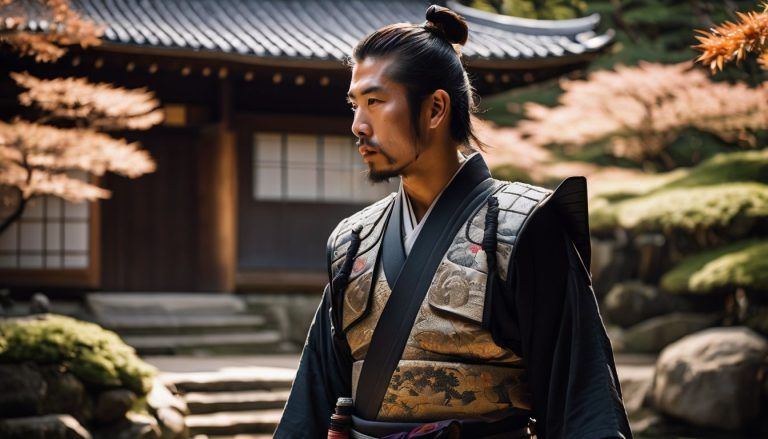The Symbolism and Significance of Traditional Tiger Tattoos in Tattoo Art
Many admire the fierce beauty of tiger tattoos but wonder what deeper meanings they hold. These striking designs aren’t just about looks; they carry a long history of symbolism in cultures around the world.
Our blog will dive into the tales and traditions that make tiger tattoos so much more than skin deep. Get ready to explore their wild significance!
Key Takeaways
- Traditional tiger tattoos are deeply rooted in Asian culture, where they represent strength, courage, and protection. The designs vary across different cultures like China, Thailand, Native America, Polynesia, Hinduism, and Buddhism.
- Tiger tattoos symbolize personal qualities such as power, confidence, independence and the ability to overcome challenges. They serve as a reminder of inner fortitude for both men and women who choose to wear them.
- There are various styles of traditional tiger tattoos that include Japanese Irezumi with its bold lines and vibrant colors; American Traditional known for iconic imagery; Neo Traditional which blends classic motifs with modern techniques; and Blackwork emphasizing contrast with solid black ink.
- Modern interpretations of traditional tiger tattoos mix elements from realism or watercolor techniques into the designs. This allows individuals to personalize their body art further while retaining the symbolism of tigers.
- The cultural significance behind tiger tattoos is immense – representing protection against evil in Chinese mythology; embodying deity attributes in Hinduism; signifying enlightenment in Buddhism; reflecting bravery in Native American traditions; expressing guardianship authority in Polynesian culture.
The History and Evolution of Traditional Tiger Tattoos
Traditional tiger tattoos originated in Asia, where they held significant cultural and spiritual meanings. Over time, these tattoos have evolved in tattoo art, incorporating different styles and techniques to convey the strength and power associated with the tiger.
Originated in Asia
Tiger tattoos have deep roots in Asia, where these majestic creatures symbolize a multitude of powerful traits. They’re woven into the fabric of Asian culture, reflecting strength, speed, and passion.
In many traditions across this vast continent, tigers represent not just physical power but also an intense spiritual force. People often choose to ink their skin with tiger images to embody these dynamic qualities.
Cultures from China to Thailand hold the tiger in high regard within their mythologies and practices. From the protective sak yant muay thai tattoos that fighters wear for courage and might in battle to Chinese lore which regards the tiger as a guardian against evil spirits, this animal carries profound significance.
These traditional tiger tattoo designs travel far beyond their origin lands, attracting individuals worldwide who desire to express respect or connect with the deeper meaning behind this fierce yet revered creature’s symbolism.
Significance in different cultures
Originating in Asia, traditional tiger tattoos hold significant meaning across various cultures. In many Asian societies, tigers symbolize power, speed, passion, and ferocity. They are often associated with protection and strength.
Similarly, in Chinese mythology and folklore, the tiger represents courage and is believed to protect against evil spirits. In Hinduism and Buddhism, the tiger is a symbol of power as well as prowess over evil forces.
Moreover, within Native American and Polynesian cultures, the tiger embodies attributes of bravery and spiritual significance.
Evolution in tattoo art
Tattoo art has evolved alongside cultural changes, incorporating a wide array of styles and techniques. Traditional tiger tattoos have seen an evolution in design over the years, with modern artists infusing vibrant colors and intricate details into the classic motifs.
The integration of elements from other tattoo styles adds a contemporary twist to traditional tiger tattoos, allowing for greater personalization and self-expression. This evolution reflects the dynamic nature of tattoo art as it continues to adapt to individual preferences and diverse artistic influences.
Moving forward into “Symbolism of Traditional Tiger Tattoos,” let’s explore the deep-rooted meanings behind these timeless designs.
Symbolism of Traditional Tiger Tattoos
Traditional tiger tattoos symbolize strength, power, confidence, and courage. They are often chosen by individuals seeking to showcase their independence and resilience through body art.
Strength and power
Tiger tattoos are a symbol of immense strength and power, representing courage and resilience. In many cultures, tigers embody fearlessness and passion, making them a popular choice for those seeking to convey their inner fortitude through body art.
These tattoos are embraced by people of all genders as they exude confidence, independence, and the ability to overcome challenges. The symbolism of tiger tattoos extends beyond mere physical strength, encompassing mental fortitude as well.
The significance of traditional tiger tattoos lies in their representation of inner strength and bravery that transcends gender boundaries. Embracing the symbolism behind these tattoos allows individuals to express their personal convictions with powerful imagery that speaks volumes about their character.
Confidence and independence
After representing strength and power, traditional tiger tattoos also symbolize confidence and independence. Embracing the spirit of the tiger, wearers of these tattoos convey a sense of fearlessness and self-assuredness.
The symbolism behind tiger tattoos can hold different meanings for individuals, including respect, appreciation, and other symbolic significance such as pride in one’s personal identity.
Additionally, tiger tattoos are not limited to any specific gender; men, women, genderfluid individuals all celebrate the symbolism and significance of these designs as a representation of inner strength.
Protection and courage
The symbolism of traditional tiger tattoos extends to embody protection and courage. These tattoos are often chosen to represent the wearer’s ability to face challenges with fearlessness and resilience.
Tigers, as solitary animals, symbolize independence and self-confidence, inspiring individuals to embrace their inner strength. The design of a tiger tattoo can vary widely, allowing for personalization that reflects one’s own interpretation of courage and protection in the face of adversity.
Tiger tattoos have become a popular choice for people seeking to express their inner fortitude through body art. The significance behind these tattoos is rooted in the belief that tigers symbolize bravery and safeguarding against harm.
Different Styles of Traditional Tiger Tattoos
From Japanese Irezumi to American Traditional and Neo Traditional, traditional tiger tattoos showcase a variety of styles that hold deep cultural and artistic significance in tattoo art.
Read on to explore the diverse world of traditional tiger tattoos!
Japanese Irezumi
Japanese Irezumi, a traditional style of tattooing in Japan, holds deep cultural significance and rich symbolism. This style often features iconic motifs such as tigers, dragons, and koi fish.
The Japanese term “irezumi” translates to “insert ink,” referring to the traditional hand-poking method used in the past. These tattoos are known for their intricate details, bold lines, and vibrant colors, reflecting themes of strength, power, and protection.
In Japanese culture, tiger tattoos symbolize courage and resilience while also embodying the qualities of a noble protector.
The art of Japanese Irezumi has evolved over centuries but still maintains its distinct characteristics that make it highly recognizable. Traditional Japanese tattoo artists use specific techniques to create these stunning designs that tell stories through powerful imagery.
American Traditional
American Traditional tiger tattoos are characterized by bold outlines, solid colors, and iconic imagery. The style originated in the United States and became popular in the early 20th century.
This traditional tattoo design often features a fierce-looking tiger with a prominent presence. The imagery typically includes strong lines and minimal shading, creating a striking visual impact.
American Traditional tiger tattoos are known for their timeless appeal and have remained influential in the world of tattoo art.
Tiger tattoos in the American Traditional style carry the symbolism of strength, courage, and protection. They represent an enduring symbol of fearlessness and resilience, making them a popular choice among tattoo enthusiasts.
Neo Traditional
Neo Traditional tiger tattoos are a modern take on the classic traditional style, incorporating bold lines and vibrant colors while maintaining the symbolic significance of strength and power.
These tattoos often feature a mix of traditional elements with contemporary artistic techniques, creating visually stunning designs that capture the essence of the tiger’s symbolism in a fresh and innovative way.
With intricate details and creative shading, Neo Traditional tiger tattoos offer a dynamic and personalized interpretation of this timeless symbol, allowing individuals to express their own unique connection to its meanings.
Tattoo enthusiasts embrace Neo Traditional tiger designs for their ability to combine traditional symbolism with modern artistry, creating eye-catching pieces that represent courage, resilience, and personal empowerment.
Blackwork
Moving on from the intricate and vibrant designs of Neo Traditional tiger tattoos, another style that has gained popularity is Blackwork. This bold and striking tattooing technique involves using solid black ink to create geometric patterns, intricate linework, and large areas of solid black shading.
With its emphasis on contrast and negative space, Blackwork tiger tattoos can convey a sense of strength, power, and mystery. The use of bold lines and dark pigments makes for a dramatic visual impact, embodying the fierce nature traditionally associated with tigers in tattoo art.
The simplicity of Blackwork tiger tattoos allows for a powerful representation of the symbolic meanings associated with these majestic creatures. The use of stark contrasts creates an intense aesthetic that captures the essence of courage and fearlessness often conveyed by traditional tiger tattoos.
Cultural and Spiritual Meanings of Traditional Tiger Tattoos
In Chinese mythology, the tiger symbolizes protection and wards off evil spirits. In Hinduism and Buddhism, the tiger represents strength and power, while Native American and Polynesian cultures associate it with courage and bravery.
In Chinese mythology
In Chinese mythology, tigers are revered as powerful and majestic creatures, symbolizing strength, courage, and protection. Tigers are associated with the element of wood and are believed to have the ability to ward off evil spirits.
The White Tiger is one of the Four Symbols in Chinese cosmology, representing autumn, the west, and death – all aspects that link it closely with traditional tiger tattoos.
Moving on to explore “In Hinduism and Buddhism”..
In Hinduism and Buddhism
In Hinduism and Buddhism, the tiger holds significant symbolism, representing power, strength, and protection. In Hindu mythology, the goddess Durga is often depicted riding a tiger, symbolizing her courage and victory over evil forces.
Tigers are also associated with the god Shiva as they represent his fierce nature and prowess in battle. In Buddhism, tigers are seen as symbols of enlightenment and spiritual awakening.
The imagery of a tiger reflects the importance of harnessing one’s strength to overcome obstacles on the path to enlightenment.
In Native American and Polynesian cultures
In Native American and Polynesian cultures, the tiger holds a unique symbolic meaning. In some Native American traditions, the tiger represents strength, protection, and bravery. The animal is revered for its powerful and independent nature.
In Polynesian cultures, the tiger symbolizes courage, authority, and guardianship. These cultural interpretations of the tiger tattoo reflect a deep connection to nature and spirituality.
Tiger tattoos in Native American and Polynesian cultures often serve as symbols of resilience and determination. They embody traits that are highly valued within these communities—attributes such as fearlessness, fortitude, and honor.
Modern Interpretations of Traditional Tiger Tattoos
Incorporating elements of other tattoo styles, like realism or watercolor, and using vibrant colors and intricate details to personalize and express the individual’s story through their traditional tiger tattoo.
Read on to explore the various cultural and spiritual meanings behind these powerful tattoos!
Incorporating elements of other tattoo styles
Tattoo artists blend traditional tiger tattoo designs with elements from other styles, such as realism or watercolor techniques. This fusion allows for vibrant colors and intricate details to be incorporated into the classic tiger motif, providing a modern twist on this timeless symbol of strength and power.
Artists draw inspiration from various tattoo styles to create personalized and expressive traditional tiger tattoos that resonate with individuals seeking meaningful and unique body art.
The incorporation of different elements results in a fresh interpretation of the traditional tiger tattoo, making it relevant to contemporary tattoo culture while retaining its deep-rooted symbolism.
Use of vibrant colors and intricate details
Incorporating elements of other tattoo styles allows for the use of vibrant colors and intricate details in traditional tiger tattoos. This modern interpretation adds a dynamic dimension to the symbolism, giving individuals the opportunity to personalize their tattoos with bold and eye-catching hues.
The intricate detailing brings out the ferocity and power of tigers, enhancing the overall impact of the tattoo. These vivid colors and detailed designs further emphasize the strength, courage, and resilience associated with traditional tiger tattoos.
The use of vibrant colors in traditional tiger tattoos not only captures attention but also infuses them with a contemporary flair that resonates with individuals seeking to express their own unique interpretations of strength and power.
Personalization and expression
Tiger tattoos offer a unique canvas for personalization and self-expression, allowing individuals to incorporate their own meaningful elements into the design. Through vibrant colors, intricate details, and varying styles, such as Japanese Irezumi or American Traditional, people can tailor their tiger tattoos to reflect their individuality.
This art form enables them to convey traits like strength, courage, and resilience in a way that resonates with their personal experiences and beliefs. Additionally, traditional tiger tattoos hold cultural significance across various societies and are open to interpretation by people of all genders.
Furthermore, individuals have the freedom to infuse modern interpretations into traditional tiger tattoo designs while embracing the deep symbolism associated with these powerful creatures.
Conclusion
In conclusion, traditional tiger tattoos hold deep symbolism and significance in tattoo art. The evolution of these tattoos reflects the enduring values of strength, power, and courage across various cultures.
Modern interpretations continue to blend tradition with individual expression by incorporating personal elements and vibrant colors. Embracing the rich heritage of traditional tiger tattoos allows individuals to convey their own meanings while honoring the timeless symbolism of these iconic designs.
FAQs
1. What do traditional tiger tattoos represent?
Traditional tiger tattoos often symbolize strength and courage, making them a powerful choice in old school tattoo art.
2. Why are tigers common in traditional tattoo designs?
Tigers are a popular animal motif in traditional tattoos because they carry significant meaning and are admired for their fierce nature in many cultures.
3. Can you tell me the significance of having a tiger tattoo?
The significance of tiger tattoos may vary, but generally, it represents fearlessness, power, and free spirit within the traditional tattoo culture.
4. Are there specific patterns used in traditional tiger tattoos?
Yes! Traditional tattoo patterns for tigers usually include bold lines and vibrant colors that capture the essence of this majestic creature’s symbolism.
5. How does cultural symbolism play into traditional tiger tattoos?
Cultural symbolism is key—each element in a traditional tiger tattoo can hold deep meanings influenced by various traditions and beliefs about animal symbolism.










